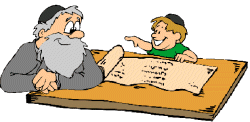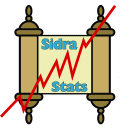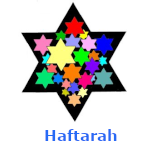BeHa’alothekha
בְּהַעֲלֹתְךָ
Numbers 8:1 – 12:16
The Menorah
HaShem spoke to Moses, telling him to speak to Aaron and say: “When you raise up the lamp, seven lights should illuminate the menorah.”
Aaron did as HaShem had commanded him and lit the menorah.
The menorah was made of a single piece of beaten gold and was made exactly to the vision that HaShem had shown Moses.
Taking the Levites
HaShem spoke to Moses, saying:
Take the Levites and purify them. After they have shaved their entire bodies with a razor, you must sprinkle water on them from the sin offering. They shall immerse their bodies and clothing and they will be clean.
Take a young bull as a burnt offering, along with its grain offering, and a second bull as a sin offering.
Bring the Levites to the front of the Communion Tent and gather the entire Israelite community. Present the Levites before me and the community for they will become the ones to perform God’s service. This is the way I will separate them from the rest of the Israelites, and the Levites shall become mine.
This is because the first born of Israel are mine, man and beast alike. I sanctified them when I killed the first born of Egypt. I now take the Levites in place of the first born of Israel and give them as a gift from Israel to Aaron and his decedents. They shall perform services in the Communion Tent and atone for the Israelites so the Israelites will not be subject to divine wrath when they approach the sanctuary.
Moses, Aaron and the entire Israelite community did as HaShem had commanded them.
Levites’ Terms of Service
HaShem spoke to Moses, saying:
This is the rule for the Levites: Beginning at the age of 25, they shall help in the Communion Tent. Then when they are 50, they shall retire from the work force and serve no more.
During this period they will help the priests in the Communion Tent. They shall not participate in the divine service.
Passover in the Desert
In the first month of the second year of the Exodus from Egypt, HaShem spoke to Moses in the Sinai Desert, saying: The Israelites shall prepare a Passover offering on the 14th of this month in the afternoon. They must prepare it in accordance with all its decrees and laws.
Moses spoke to the Israelites and they did as HaShem had told them.
There were some people who had had contact with the dead and were therefore ritually unclean, so they could not prepare the Passover offering that day. They asked Moses and Aaron, “Why should we lose out and not be able to present HaShem’s offering at the proper time like the other Israelites?”
“Wait here,” Moses replied, and he went to ask HaShem.
Making up the Passover Offering
HaShem spoke to Moses, telling him to speak to the Israelites, saying:
If any person is ritually unclean from contact with the dead, or is on a distant journey, whether they are with you now or in future generations, they will still have the opportunity to prepare my Passover offering. They shall prepare it in the afternoon of the 14th day of the second month (14 Iyar, one month after the regular Passover), and they shall eat it with matzas and bitter herbs. There can’t be any leftovers, nothing saved over till morning.
However, if you are ritually clean and not on a distant journey and you do not prepare the Passover offering, you will be spiritually cut off from your people.
If someone joins you, they too shall prepare the Passover offering. There is a single law for all, native born and people who join your community.
Signs in the Desert
On the day the Tabernacle was erected, a cloud covered the Tabernacle, the Tent of Testimony. During the evening, there was something that looked like fire over the tabernacle and it remained there until morning. From then on it was like that, a cloud by day and a fire by night. Whenever the cloud rose up from the Tent, the Israelites would follow it, and would camp where the cloud rested. Sometimes the cloud remained only one night before it moved on and sometimes it remained in one spot for many months, but they kept their trust in HaShem’s word and moved at HaShem’s command.
The Silver Trumpets
HaShem spoke to Moses telling him to make two silver trumpets, to be used to assemble the community, and to signal the camps to break-camp for the journey.
When both of the trumpets are sounded with a long note, the entire community shall assemble at the Communion Tent entrance, but if a long note is sounded by just one trumpet, only the princes, who are leaders of thousands, will gather to you.When you sound a series of short notes, the camps to the east shall begin to march. Then, when you sound the second series of short notes, the camps to the south will set out. Thus will you signal each camp to march, with a series of short notes.The priests who are the decedents of Aaron shall be the ones who sound the trumpets. This shall be an eternal law for future generations.
When you go to war against an enemy who attacks you in your land, you will sound a staccato on the trumpets and you will be remembered and delivered from your enemies.
Sound also a note with the trumpets, on your days of rejoicing, festivals and new-moon celebrations, when you present your burnt offerings and your peace offerings, as a remembrance before your G-d.
Journey Through the Sinai
In the second year of the Exodus on the 20th of the second month, the cloud rose from the Tabernacle of Testimony. The Israelites began their journey from the Sinai until it came to rest in the Paran Desert. This was the first journey at HaShem’s word through Moses.
Chovev
(At this point the text changes subject abruptly, and tells this story, which we know happened before the giving of the law. Yithro, [according to the Sages, the same person as Chovov], and his leaving of the camp are related briefly in the Parasha Yithro.)
Moses said to his father-in-law, Chovev, “We are now on our way to the place HaShem promised to us. Come with us and we will let you share the benefit of all the good things that HaShem has promised Israel.”
“I would rather not go with you” he replied, I would like to return to my home land.”
“Do not abandon us,” replied Moses, “After all, you are familiar with the places that we will camp and can be our guide. If you go with us we will share with you whatever good HaShem grants us.”
The Israelites marched for three days (about 100 miles). The Ark of the Covenant traveled ahead of them for those three days to find them a place to settle. (Usually, the Ark traveled in the middle of the Israelites, as it was ordered in Parashat Bemidbar). This time HaShem’s cloud remained over them as they traveled during the day.
The Ark Goes Forth
When the Ark went forth, Moses said “Arise HaShem and scatter your enemies! Let your foes flee from you.”
When it came to rest, he said, “Rest your presence on Israel’s thousands.”
Both of the above quotes are used in the Shabbat and festival services to this day as the Torah is removed from the Ark and returned to it respectively.
The Complaints
The people began to complain (again), and HaShem was angered. He displayed his anger and fire shot out consuming the edge of the camp. Moses prayed to HaShem and the fire died down. Moses named the place Tabh’erah (“Burning”) because it was the place where HaShem had burned them.
People among the Israelites asked “Who is going to give us meat to eat? We remember the fish in Egypt that was free. Now all we have is manna.”
The manna was like coriander seed with a pearl-like luster. The people could simply walk and gather it. They would grind it in a hand mill and cook it into cakes.
“Why are you treating me so badly?” Moses asked HaShem, “Don’t you like me anymore? Why are you putting such a burden on me? Where can I get enough meat to feed everyone who is complaining? I cannot be responsible for this entire nation. It’s too hard for me!”
HaShem said to Moses, “Assemble 70 leaders of Israel who are elders. Bring them to the Communion Tent and let them stand there with you. I will allow them to share the holy essence I have bestowed upon you and you will not have to bear your responsibilities all alone.
Tell your people to prepare to eat meat. They have whined at me long enough. If they want meat to eat, I will give them meat to eat until are sick of it and it comes out of their noses: they must eat meat for a full month. This is because they have rejected HaShem, and complained so much.”
But Moses said to HaShem, “There are 600,000 of us. Even if all our animals were slaughtered, we would not have enough for all for a month.”
HaShem replied, “Do you think my power has become limited, or that I’m incapable of keeping my word? You will see now if my word will come true or not.”
Moses told the people what HaShem had said and six elders from each of the 12 tribes were gathered together, making a total of 72. Two (Eldad and Medad) were excluded by lot so there would be only 70 as HaShem had instructed, then Moses and the 70 gathered at the Tent. Then HaShem descended in a cloud and caused the spirit that had been bestowed upon Moses to be given also to those elders. When they gained that gift of prophecy, they did not lose it. Although the two who were excluded did not go to the Tent, they also spoke prophetically in the camp.
A young man ran to tell Moses, “Eldad and Medad are speaking prophecy in the camp”
Another man, Moses’ attendant, Joshua, son of Nun, spoke up and said, “My lord Moses, you must stop them!”
“Are you jealous for my sake?” Moses asked. “I only wish all of HaShem’s people would have the gift of prophecy. Let HaShem grant that spirit to them all!” Then he turned and went back to the camp.
HaShem caused the wind to start blowing, sweeping up the quail from the place where they rested on the Red Sea, and they flew with the wind until they ran out of strength, then they fell to the ground all around the camp, even as far as a day’s journey (about 34 miles). The people gathered quail all that day and night, and even all the next day. Even those people who got the least had gathered about one thousand pounds of meat.
The people ate and ate of the quail, but HaShem’s anger was soon displayed as they were struck with an extremely severe plague. The meat was still between their teeth when they began dying.
Moses named that place “Graves of Craving” where they buried the people who had so craved meat that they whined at HaShem. Miriam and Aaron began to speak unkindly about Tzipporah, the woman Moses married. She was from Ethiopia and had dark skin, and for this reason they spoke ill of her. Then they began to complain, “Why does HaShem only speak to Moses?”
HaShem heard their complaints and ordered Moses and Aaron and Miriam to go to the Communion Tent. HaShem summoned Aaron and Miriam to come forward, into the Tent. There HaShem descended in a pillar of cloud and said to them: “Listen carefully to my words. If someone among you experiences divine prophecy, then when I speak to them it will be in a dream. I speak to Moses face-to-face because I trust him in all things. I speak to him directly, in a vision and not in allegory, so he sees a true picture of HaShem. How is it you are not afraid to speak against my servant Moses?”
HaShem was very angry and made Miriam leprous, white like snow where the skin had rotted. Aaron saw her and said to Moses, “Please, my lord, do not hold a grudge against us for acting foolishly and sinning.”
And Moses cried out to HaShem, “Oh HaShem, please heal her!”
HaShem said to Moses, “If her father had spit in her face, she would be embarrassed for seven days. Let her remain quarantined outside the camp for seven days and then she can return home.”
The people did not move on until Miriam’s punishment was over, then they moved on to the Paran Desert.
Haftarah Connection

Zechariah 2.14-4.7
This week’s Parsha explains how the menorah is to be lit.
In the Haftara the prophet has a vision of a menorah. An angel tells him that it is symbolic of the victory that can be achieved not with armies or might but through the spirit of HaShem.
Sidra Stats

- Thirty-Sixth of 54 Sedras in the Torah
- Written on 240 lines in the Sefer Torah
- 136 P’sukim (verses)
- 1,840 words
- 7,055 letters
Next week’s Parashat: Sh’lach


